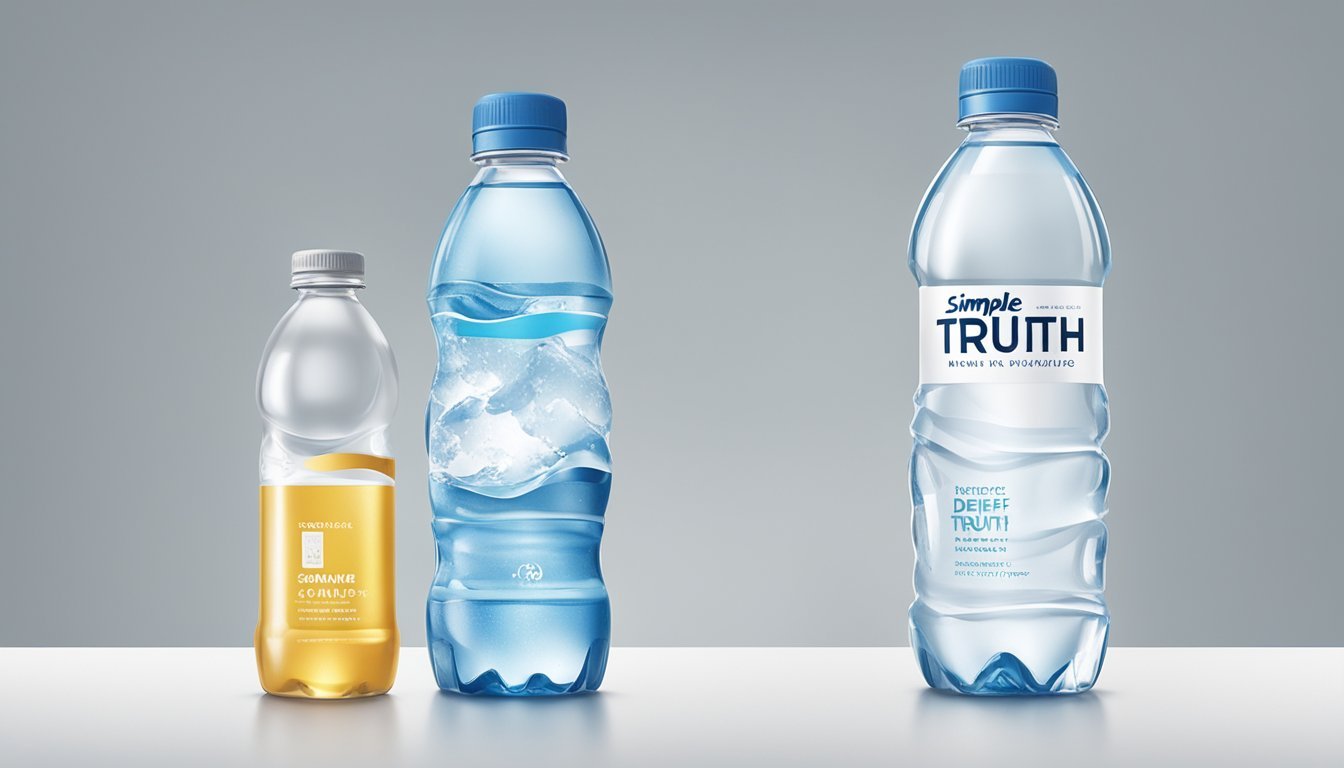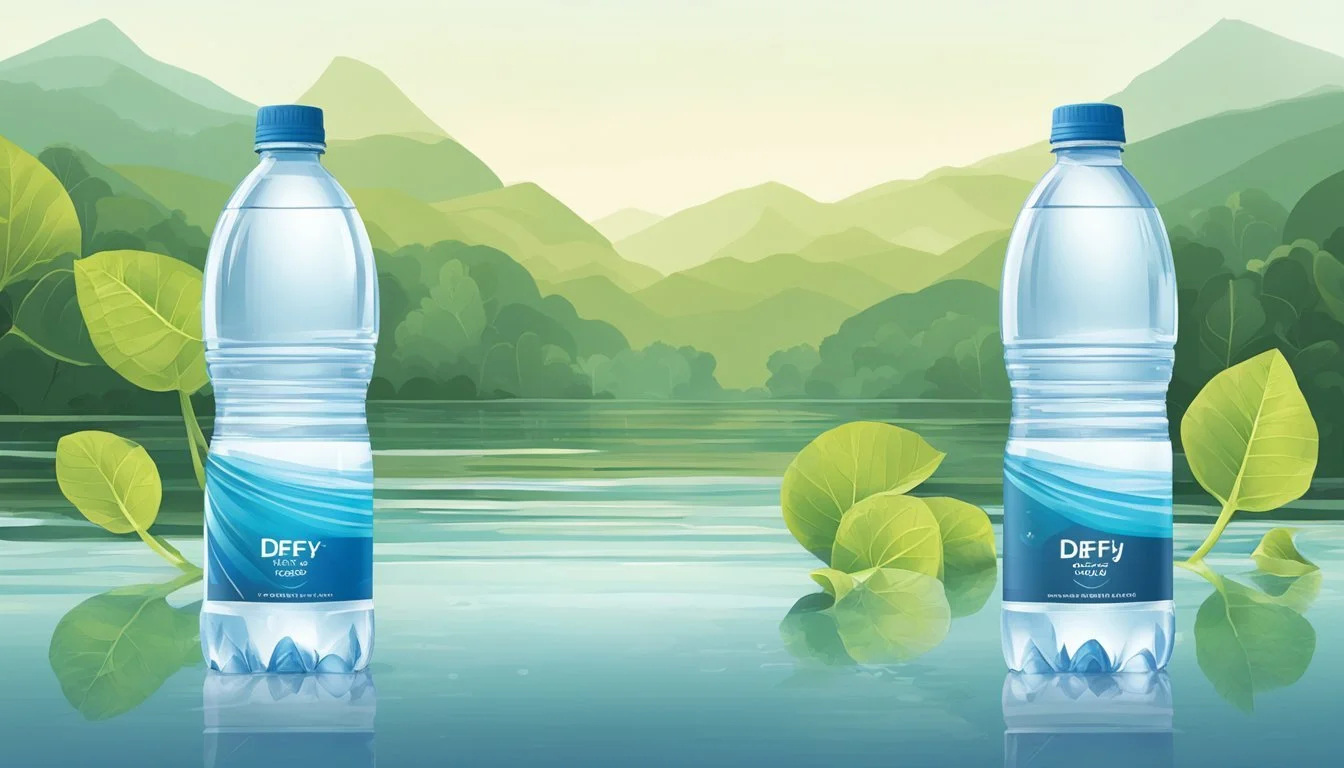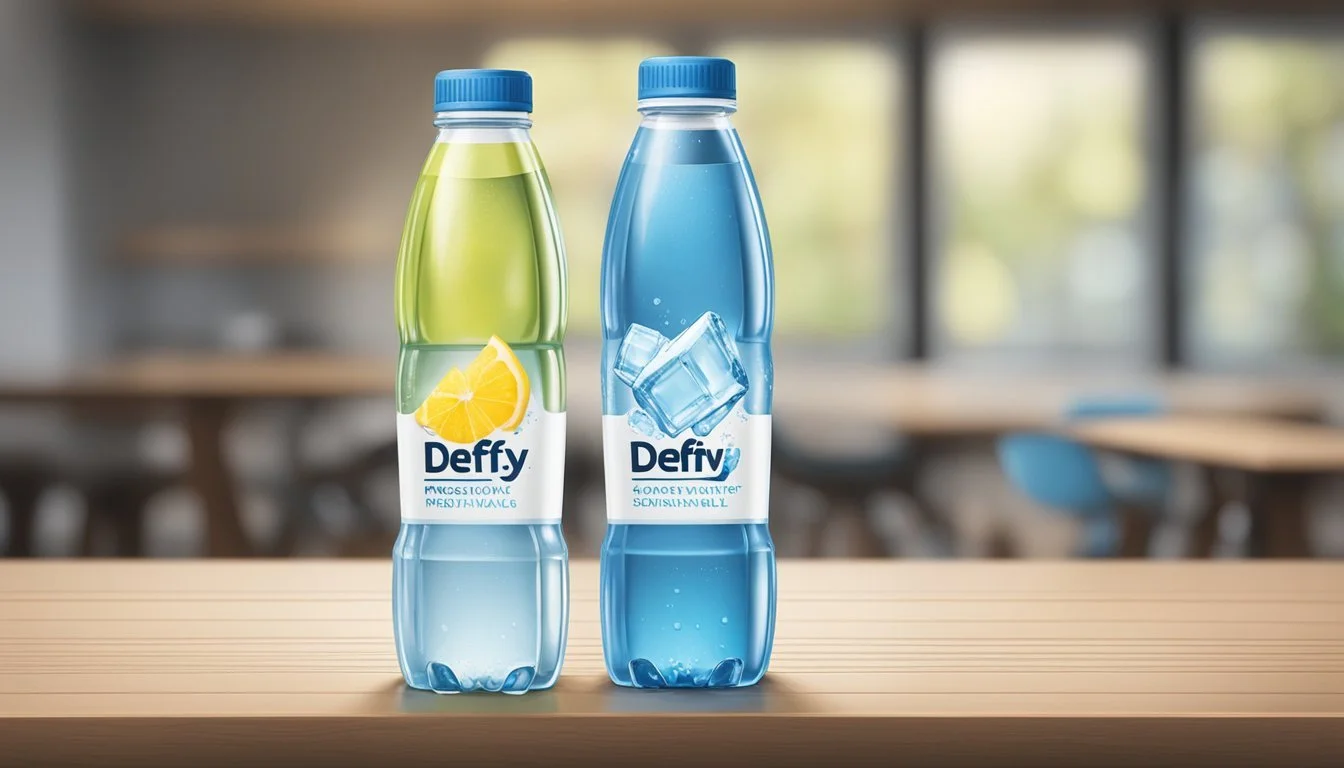Simple Truth vs. Defy
Bottled Water Battle Analysis
For consumers seeking hydration on the go, the choices can be overwhelming. In the crowded market of bottled water, Simple Truth and Defy stand out. Simple Truth offers alkaline water with a pH level of 8, sourced from Crystal Falls Springs, Michigan, and promises a clean, refreshing taste. Defy positions itself as a premium brand, known for its crisp and pure quality.
When comparing the two, it's essential to consider what matters most to the consumer—taste, pH level, or source quality. Simple Truth's alkaline water might appeal to those looking for the potential health benefits of higher pH levels, while Defy's emphasis on premium quality targets those who prioritize taste and purity.
Ultimately, the choice between Simple Truth and Defy depends on individual needs and preferences. For some, the reassurance of an alkaline pH might be the deciding factor. For others, the premium feel of Defy’s water could be more appealing.
Understanding Bottled Water
Bottled water is diverse, ranging from purified to mineral types, each with specific characteristics. Regulatory bodies like the FDA and IBWA set safety standards to protect public health.
Definition and Types of Bottled Water
Bottled water comes in various forms tailored to different tastes and public needs. Purified water undergoes processes like distillation or carbon filtration to remove impurities. Spring water is collected from natural springs and retains its natural mineral content. Mineral water has a consistent level of minerals and trace elements directly from its source. Alkaline water possesses a higher pH level, aimed at reducing acidity. Artesian water is sourced from confined aquifers and is valued for its purity.
Regulations and Safety Standards
The FDA (Food and Drug Administration) regulates bottled water based on stringent safety guidelines akin to the EPA standards for tap water. Bottled water facilities must adhere to good manufacturing practices, ensuring contamination-free production, storage, and maintenance. Each bottle's label must accurately reflect its contents, including the water type and source. This transparency ensures consumers make informed choices.
The Role of the International Bottled Water Association (IBWA)
The IBWA plays a crucial role by advocating for high-quality standards and safety in the bottled water industry. It insists on annual audits that verify compliance with its Model Code, beyond FDA regulations. The association also promotes sustainability practices among its members to reduce the environmental impact through recycling initiatives and reduced plastic usage. The IBWA is an essential entity in maintaining industry integrity and public health safety.
Comparing Simple Truth and Defy
Simple Truth and Defy bottled water brands both offer distinctive features that cater to different consumer preferences. This section examines their brand profiles, source and production methods, and water quality and pH levels.
Brand Profiles
Simple Truth is known for offering budget-friendly, eco-conscious products, primarily through The Kroger Co. Simple Truth Artesian water, specifically, touts its alkalinity and natural sourcing.
Defy, on the other hand, positions itself as a premium bottled water brand, often marketed toward athletes and health enthusiasts. Defy emphasizes rigorous filtration and purity, often leveraging marketing that underscores its supposed health benefits over regular bottled water.
Source and Production Methods
Simple Truth Artesian water originates from a naturally occurring artesian well. The water is bottled at the source by Crystal Falls Springs, INC, located in Crystal Falls, Michigan. Their focus is on preserving the natural purity of the water during the minimal processing stages.
Defy utilizes a reverse osmosis filtration process to ensure a high degree of purity. Their water is often sourced from municipal supplies and undergoes extensive filtration, which includes the addition of electrolytes to enhance hydration.
Water Quality and pH Levels
Simple Truth boasts a high alkaline level, generally around a pH of 8-9. This alkalinity is believed by some to offer potential health benefits such as better hydration and neutralizing body acidity.
Defy, focusing more on purity and filtration, ensures that its water is free from contaminants and impurities. The pH level of Defy water typically ranges between 7-8, making it slightly alkaline as well. They incorporate a blend of electrolytes to improve taste and hydration quality.
In sum, Simple Truth emphasizes natural alkaline sources, while Defy highlights advanced filtration and added electrolytes for superior hydration. If consumers value natural sourcing and alkalinity, Simple Truth might be their choice. Those looking for meticulously filtered water with added electrolytes may prefer Defy.
Filtering Techniques and Their Impact on Quality
Filtering techniques play a vital role in determining the quality of bottled water. Key considerations include the filtration methods used and the resulting effects on mineral content and taste.
Reverse Osmosis and Filtration Methods
Reverse osmosis is a widely used filtration method that removes impurities by forcing water through a semipermeable membrane. This process eliminates contaminants such as bacteria, viruses, and chemical pollutants.
Other filtration methods include activated carbon filters, which effectively remove chlorine and organic compounds, and UV filtration, which targets microbial contaminants. Each method has its distinct advantages, but reverse osmosis generally achieves the highest purity.
Choosing the right water filter depends on the desired purity level and specific contaminants present. Reverse osmosis systems often result in water with very low levels of impurities, making it suitable for those looking for high-quality, clean drinking water.
Effects on Mineral Content and Taste
Filtration methods significantly impact the mineral content and taste of bottled water. Reverse osmosis can strip water of beneficial minerals such as calcium and magnesium. This can lead to a flatter taste, prompting manufacturers to add minerals back for flavor enhancement.
Mineral content affects both the health benefits and taste profile of the water. Some consumers prefer the crisp taste of mineral-rich water achieved through less rigorous filtration methods like activated carbon.
The balance between purity and mineral content is crucial. While highly purified water through reverse osmosis is beneficial for removing harmful substances, maintaining some mineral content can enhance both taste and overall health benefits.
Manufacturers must decide which balance aligns with consumer preferences, ensuring the final product meets both safety standards and taste expectations.
Environmental Considerations
When comparing Simple Truth and Defy bottled water, it's vital to examine their environmental impact, particularly regarding plastic waste and the availability of eco-friendly alternatives.
Plastic Waste and Recycling Issues
Simple Truth bottled water typically uses recyclable plastic. However, the recycling rates in many areas are still low. This results in a significant amount of plastic waste ending up in landfills and oceans. This environmental impact poses considerable threats to marine life and contributes to the broader issue of pollution.
Defy also comes in plastic bottles, which face similar recycling and waste problems. The high demand for bottled water exacerbates the problem, leading to increased pressure on recycling facilities. While efforts are made to ensure the bottles are recyclable, actual recycling outcomes vary by region.
Recycling processes themselves can be energy-intensive, impacting their overall eco-friendliness. Thus, while both brands prioritize recyclable materials, the effectiveness of these efforts largely depends on local waste management practices.
The Eco-Friendly Alternatives
To mitigate the environmental impact, consumers might consider eco-friendly alternatives such as reusable bottles. Stainless steel and glass bottles present more sustainable options. Simple Truth has started offering some of its products in glass bottles, which are more environmentally friendly due to their reusability and lower environmental footprint.
Defy may need to explore similar alternatives to stay competitive in eco-conscious markets. Encouraging the use of reusable bottles can significantly reduce plastic waste. Moreover, brands can adopt eco-friendly packaging, like compostable or biodegradable materials, to enhance sustainability.
Supporting products that invest in environmentally friendly packaging options helps reduce the long-term plastic waste problem. Educational initiatives by brands can also play a vital role in promoting the use of sustainable alternatives.
Cost-Benefit Analysis
Simple Truth and Defy bottled waters each offer unique attributes that influence their cost-effectiveness and overall value. Key points of consideration include price comparisons and the spectrum of expensive versus affordable options.
Price Comparisons and Value for Money
When comparing prices, Simple Truth generally markets itself as an affordable yet quality option in the bottled water market. Its price point is accessible to the average consumer, making it a popular choice for daily hydration needs.
Defy, on the other hand, often positions itself as a premium alkaline water option. This higher pricing reflects its targeted benefits, including enhanced hydration and potential health impacts.
To assess value for money, one must consider:
Simple Truth: Offers competitive pricing, fostering broad accessibility and regular purchase.
Defy: Higher price reflects potential added health benefits and specialized processing.
Here’s a simple comparison:
Brand Price Range Key Value Proposition Simple Truth Affordable Quality hydration at a budget price Defy Premium/Expensive Enhanced hydration, potential health benefits
Expensive vs. Affordable Options
Simple Truth caters primarily to consumers looking for affordable hydration solutions without compromising on quality. Positioned in mainstream grocery stores, it appeals to cost-conscious buyers.
Defy targets a niche segment seeking sophisticated wellness benefits, hence its higher price. These consumers prioritize the perceived benefits of alkaline water and are willing to pay more for this added value.
Affordability:
Simple Truth: Widely available and cost-effective for daily use.
Defy: While more expensive, justifies its price for those valuing specialized benefits.
In conclusion, Simple Truth is suitable for budget-friendly daily hydration, whereas Defy appeals to those seeking potential health improvements and willing to invest more for premium water.
Health and Hydration
Assessing hydration needs and understanding water quality are critical for choosing the right bottled water. Electrolytes and pH balance also play significant roles in maintaining optimal health.
Hydration Needs and Water Quality
Hydration is essential for the body to function properly. Drinking sufficient water aids in maintaining bodily functions such as temperature regulation, nutrient transport, and waste removal.
Water quality is a critical factor. Filters remove contaminants to ensure safe drinking water. Factors like source, treatment methods, and packaging impact safety and taste.
Simple Truth uses a thorough filtration process, ensuring the removal of impurities. Defy, on the other hand, often advertises enhanced water quality through additional purification steps and supplementation with electrolytes.
Electrolytes and pH Balance for Optimal Health
Electrolytes like potassium and magnesium are essential. They regulate nerve and muscle function, balance blood acidity and pressure, and improve hydration.
Defy water includes trace amounts of these electrolytes, which can aid in maintaining these balances, while Simple Truth typically does not include added electrolytes.
Alkaline water with a higher pH level is believed to neutralize acid in the body. Defy emphasizes its water’s alkaline properties, claiming additional health benefits. Simple Truth maintains a natural pH, focusing on essential hydration without added alkalinity.
Deciding between the two may depend on personal health goals and preferences. Both brands offer safe and hydrating options, but the inclusion of electrolytes and pH balance may influence choice.
Consumer Experience
Analyzing both the sensory qualities and the visual appeal of Simple Truth and Defy bottled waters can illuminate their appeal to consumers. Key factors include taste, smell, packaging, and branding.
Taste and Smell Sensory Analysis
Consumers often focus primarily on the taste and smell of bottled water, as these sensory factors heavily influence their preference. Simple Truth has been described as having a crisp and clean taste, lacking any distinctive aftertaste. Consumers appreciate its neutral profile, which makes it versatile for various occasions.
Defy, meanwhile, offers a taste that some describe as smooth with a hint of minerality. This unique profile appeals to those looking for a touch of character in their bottled water. Smell is generally minimal for both brands, though some sensitive noses might detect slight differences in mineral content. The taste test results often highlight Simple Truth's straightforward and refreshing profile compared to Defy's subtle complexity.
Packaging and Branding Influence
Packaging and branding significantly impact consumer decisions, transcending mere aesthetics. Simple Truth features minimalist and eco-friendly packaging with clear, informative labeling. This aligns with environmentally conscious consumers who prioritize sustainability in their purchase decisions.
Defy's packaging, on the other hand, is modern and sleek, with distinctive branding aimed at a more youthful and active demographic. The bottles are designed for convenience, fitting easily into an active lifestyle with portable and durable materials.
Both brands cater to different aspects of consumer experience. Simple Truth appeals to those valuing simplicity and environmental responsibility, while Defy attracts consumers who prefer a more dynamic and stylistically assertive product. These nuanced approaches to packaging and branding influence buyer preferences and reinforce the brand identities of each bottled water.
Closing Remarks on Personal Preference and Choice
Choosing between Simple Truth and Defy bottled water often comes down to personal preference. Each brand offers a unique experience tailored to different needs and tastes.
Simple Truth water is appreciated for its natural minerals and eco-friendly packaging. It's a great choice for those who prioritize sustainability and natural taste.
Defy water, known for its advanced purification process, caters to individuals seeking a clean and crisp taste. Its packaging often highlights durability and convenience, appealing to on-the-go consumers.
When determining the best bottled water, consider factors like mineral content, packaging, and taste. Simple Truth's more natural approach might be preferable for eco-conscious individuals, while Defy’s technological edge might attract those looking for enhanced purification.
Variety within each brand also plays a significant role. Both offer multiple sizes and types, ensuring there is an option for every preference.
The choice between Simple Truth and Defy ultimately rests on what you value most in bottled water. Whether it's sustainability, taste, or packaging, understanding these aspects can help make an informed decision.
Being clear on preferences helps in choosing the right product to meet one’s daily hydration needs. Making a switch to a preferred brand can significantly enhance the drinking experience.
More About Simple Truth
Aqua Carpatica vs Simple Truth: Which Bottled Water is Better?
Cascade Mountain vs Simple Truth: Which Bottled Water is Better?
Core Hydration vs Simple Truth: Which Bottled Water is Better?
Crystal Geyser vs Simple Truth: Which Bottled Water is Better?
Hawaii Volcanic vs Simple Truth: Which Bottled Water is Better?
Hawaiian Springs vs Simple Truth: Which Bottled Water is Better?
Ice Mountain vs Simple Truth: Which Bottled Water is Better?
Icelandic Glacial vs Simple Truth: Which Bottled Water is Better?
Liquid Death vs Simple Truth: Which Bottled Water is Better?
Mountain Valley Spring Water vs Simple Truth: Which Bottled Water is Better?
Nestle Pure Life vs Simple Truth: Which Bottled Water is Better?
Poland Spring vs Simple Truth: Which Bottled Water is Better?
Purely Sedona vs Simple Truth: Which Bottled Water is Better?
Richard's Rainwater vs Simple Truth: Which Bottled Water is Better?
San Pellegrino vs Simple Truth: Which Bottled Water is Better?
Simple Truth vs Crystal Lake: Which Bottled Water is Better?
Simple Truth vs Essence pH10: Which Bottled Water is Better?
Simple Truth vs Kirkland Signature: Which Bottled Water is Better?
Simple Truth vs Proud Source: Which Bottled Water is Better?
Simple Truth vs Talking Rain AQA: Which Bottled Water is Better?
Simple Truth vs Whole Foods 365: Which Bottled Water is Better?
Solan de Cabras vs Simple Truth: Which Bottled Water is Better?
Whole Foods Italian Still Mineral water vs Simple Truth: Which Bottled Water is Better?




